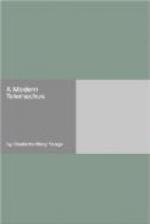‘I should fear not,’ said Arthur. ’I had not seen or heard of her for some time before I left home, and that is now three years since. She looked very old then, and I remember my mother saying she was not fit to come her rounds.’
‘She wasna that auld,’ returned the merchant gravely; ’but she had led sic a life as falls to the lot of nae wife in this country.’
Arthur had almost said, ‘Whose fault was that?’ but he durst not offend a possible protector, and softened his words into, ’It is strange to find you here, and a Mohammedan too.’
‘Hoots, Maister Arthur, let that flea stick by the wa’. We maun do at Rome as Rome does, as ye’ll soon find’—and disregarding Arthur’s exclamation—’and the bit bairn, I thocht ye said he was no Scot, when I was daundering awa’ at the French yestreen.’
’No, he is half-Irish, half-French, eldest son of Count Burke, a good Jacobite, who got into trouble with the Prince of Orange, and is high in the French service.’
’And what gars your father’s son to be secretaire, as ye ca’d it, to Frenchman or Irishman either?’
’Well, it was my own fault. I was foolish enough to run away from school to join the rising for our own King’s—’
’Eh, sirs! And has there been a rising on the Border side against the English pock puddings? Oh, gin I had kenned it!’
Yusuf’s knowledge of English politics had been dim at the best, and he had apparently left Scotland before even Queen Anne was on the throne. When he understood Arthur’s story, he communicated his own. He had been engaged in a serious brawl with some English fishers, and in fear of the consequences had fled from Eyemouth, and after casting about as a common sailor in various merchant ships, had been captured by a Moorish vessel, and had found it expedient to purchase his freedom by conversion to Islam, after which his Scottish shrewdness and thrift had resulted in his becoming a prosperous itinerant merchant, with his headquarters at Bona. He expressed himself willing and anxious to do all he could for his young countryman; but it would be almost impossible to do so unless Arthur would accept the religion of his captors; and he explained that the two boys were the absolute property of the tribe, who had discovered and rescued them when going to the seashore to gather kelp for the glass work practised by the Moors in their little furnaces.
‘Forsake my religion? Never!’ cried Arthur indignantly.
‘Saftly, saftly,’ said Yusuf; ’nae doot ye trow as I did that they are a’ mere pagans and savage heathens, worshipping Baal and Ashtaroth, but I fand myself quite mista’en. They hae no idols, and girn at the blinded Papists as muckle as auld Deacon Shortcoats himsel’.’
‘I know that,’ threw in Arthur.




